- Home
- Julia London
Highlander in Love
Highlander in Love Read online
National bestselling author Julia London creates a world of daring passions and dangerous loyalties in her wonderful novels
HIGHLANDER UNBOUND
and HIGHLANDER IN DISGUISE
“London’s characters come alive on every page and will steal your heart.”
—Atlanta Journal-Constitution
“Finely crafted characters and polished writing rich with the author’s deliciously tart humor are just a few of the delights awaiting readers in this superb love story.”
—Booklist
“Sprightly and fresh…quick with humor…whets the appetite for the unlucky-in-treasure but lucky-in-love Lockharts’ next adventure.”
—Publishers Weekly
“A perfect blend of passion, poignancy, and humor…. The likeable characters, intense emotions, and depth of sensuality only add to a story that tugs at your heart and makes you eager for the next volume in this new trilogy.”
—Romantic Times
Also by Julia London
Highlander in Disguise
Highlander Unbound
This book is a work of fiction. Names, characters, places and incidents are products of the author’s imagination or are used fictitiously. Any resemblance to actual events or locales or persons, living or dead, is entirely coincidental.
An Original Publication of POCKET BOOKS
A Pocket Star Book published by
POCKET BOOKS, a division of Simon & Schuster, Inc.
1230 Avenue of the Americas, New York, NY 10020
Copyright © 2005 by Dinah Dinwiddie
All rights reserved, including the right to reproduce this book or portions thereof in any form whatsoever. For information address Pocket Books, 1230 Avenue of the Americas, New York, NY 10020
ISBN: 1-4165-2393-6
POCKET STAR BOOKS and colophon are registered trademarks of Simon & Schuster, Inc.
Visit us on the World Wide Web:
http://www.SimonSays.com
For my very chic friend Barbara, who could never be the inspiration for any of my less-than-chic characters, and certainly none with the last name of Lockhart matching that description.
EILEAN ROS
FRIDAY, MAY 27
My dear Miss Lockhart:
I thank you for your kind letter of Wednesday past concerning the alleged curse of any daughter born to a Lockhart. I assure you that I think it all a lot of flummery. I hold firmly convinced that a lass with your considerable fortitude and spirit might marry whomever she please without a care for even the devil. Nor do I believe that a man who has bargained for the hand of a daughter of a Lockhart, and bargained quite fairly, if I may be so bold, has anything to fear, other than the usual danger of death by great exasperation owing to the Lockharts’ stubborn nature in general.
Thank you again, Miss Lockhart, for your concern for my well-being. I look forward to setting the date of our wedding.
Sincerely,
Douglas
One
EILEAN ROS, THE TROSSACHS OF THE SCOTTISH HIGHLANDS
P ayton Douglas was surrounded by the enemy, his back against the wall…or hearth, as it were. The Lockharts advanced on him with an anxious look in their eyes, and he wondered how they had managed to gain entry, today in particular, when he was entertaining some very important men from Glasgow. Men who were, at this very moment, rather deep in their cups, having sampled the barley-bree Scotch whiskey distilled here, on his estate, Eilean Ros.
But his enemies were desperate and, by their own confession, in quite a predicament, for they’d been caught completely unawares when their dear friend, Hugh MacAlister, had purloined their priceless family heirloom—a gold statue of a beastie with ruby eyes—right out from under their noses.
Griffin Lockhart, from whom the beastie had been stolen, had just argued passionately that while this outrageous insult would be avenged in due time, at the moment, it seemed that MacAlister’s actions had left the entire Lockhart family near to penniless and faced with the forced betrothal of their only daughter, Mared, to the man who had lent them a princely sum to retrieve the beastie: Payton Douglas.
The very same Payton Douglas who stood with his back against the cold hearth, eyeing the only one of the five Lockharts in his study who seemed inordinately relaxed. Seated at his writing desk, she idly twirled a quill pen as Payton stoically listened to the rather windy speech of her laird father. Frankly, one could scarcely do anything but listen when in the company of so many Lockharts.
This speech, obviously prepared in advance, judging by the way Lady Lockhart’s lips moved in unison with her husband’s, spoke to how Payton, the son of ancestors who had spilled precious Lockhart blood in every war and time of strife, would take their only daughter to wife, having bargained for her in loaning them a substantial sum that was to be repaid within a year’s time.
“’Tis the stuff of popular novels!” Lady Lockhart exclaimed.
Behind her, her daughter Mared smiled as she twirled the pen, as if that analogy amused her.
“Frankly, milady, I’ve never read a novel as befuddling as this,” Payton said. “If I am to understand, do ye mean to say ye’ll no’ honor our agreement regarding the loan I made ye?”
That question was met with a burst of nervous, high-pitched laughter from the four dark-headed Lockharts standing at this little impromptu meeting: Carson, the aging laird of what was left of the Lockhart clan; his lean and graceful lady wife, Aila; their eldest son and massive soldier, Liam; and his younger brother Griffin, who was slightly smaller and quite debonair.
“Of course no’!” Liam boomed reassuringly. “But surely ye understand that we couldna have dreamed MacAlister would betray us so.”
“As ye’ve said several times over now. Nevertheless, it would appear that he did indeed betray ye, and ye owe me a tidy sum, aye?”
The four standing Lockharts looked sheepishly at one another while Mared sighed and opened a book on his writing desk, flipping to the first page.
Grif quickly stepped forward and smiled charmingly. “If I may, milord…the problem is that without the beastie, we’ve no means to repay yer very generous loan—”
“Three thousand pounds,” Payton quickly reminded him, “was more than generous. It was sheer insanity.”
“Aye, very generous,” Grif agreed, casting an anxious glance at his family. “But we made a wee error, we did,” he said, holding thumb and index finger together to show just how wee the error.
“I beg yer pardon, but there was no error. Yer father signed the promissory papers.”
“That he did,” Grif readily agreed. “And we promised Mared’s hand to ye as collateral on yer loan, and…well, plainly put, Douglas, ’tis no secret how she feels about ye—ah, that is to say…yer reforms,” he said carefully, and exchanged a look with his mother.
“I know well how she feels, Grif,” Payton responded impatiently. Everyone in every glen in the loch region knew of Mared’s objection to marrying a Douglas and of her vehement displeasure at his introduction of sheep in and around the lochs. “’Tis no secret she doesna care for a Douglas. Yer sister, ye might have remarked, is no’ a shy lass.”
Mared chuckled softly and turned another page in the book he’d left on the writing desk, On the Winter Production of Wool and the Timely Shearing of the Na Caorridh Mora, the Big Sheep.
“No,” Grif said with a bit of a frown for Mared’s chuckle. “But ye canna fault the lass for being passionate in her beliefs.”
Mared looked up from the book then and cocked a brow above a pair of sparkling green eyes, waiting for his answer.
He, in turn, glared at the Lockharts. This was precisely what was wrong with Mared—she had been reared by this lot of blockheads. They all believed—w
ith the exception of Grif, perhaps, and even that was a questionable assumption—that the sheep he had brought into the lochs were invading the land historically grazed by their cattle and thereby pushing the cattle to smaller areas and smaller numbers and therefore pushing them, the most exasperating family in all of bloody Scotland, into poverty.
They were right in some respects. But Payton believed their cattle could not graze properly in the Highlands and were not, and had never been, a profitable venture. Bloody fools, the Lockharts, who believed in the old system of crofting the land and raising lumbering beeves. And when that did not sustain them, they turned to stealing statues or some such nonsense from their English cousins.
He, on the other hand, believed in a system that allowed a fair wage to all the men the land could reasonably support, and sheep herding and, should a man be so inclined (as he was)—whiskey production. Which was why he was eager to be done with this nonsense and return to the four men who might invest a substantial amount of money in his distillery venture.
Grif laughed uneasily again at Payton’s stoic silence. “And…and perhaps our Mared deserves just a wee bit of pity, aye?” he tried again. “After all, she’s got that wretched curse on her”—Mared nodded emphatically that she did—“and really, Douglas, can ye honestly desire her hand in marriage with that curse hanging over her like a dark cloud?”
Payton laughed derisively. “Ach, ye donna believe in that old curse! No one but crofters who fear fairies and goblins believe that old tale!”
“But ye canna deny that no daughter of a Lockhart has ever married,” Liam quickly put in. “Perhaps it is just as true that a daughter of a Lockhart willna wed until she’s looked into the belly of the beast.”
“Do ye think to frighten me with tales of a’ diabhal?” he demanded, ignoring Mared’s amused smile as she leaned back in the chair and idly ran her fingers along the edge of the writing desk.
“Frighten ye!” Lady Lockhart exclaimed, stepping in to put her hand soothingly on Payton’s arm. “No, no, milord, no’ to frighten ye. Just to speak with ye, on Mared’s behalf.”
He checked his tongue and spoke evenly. “Frankly, milady, I’ve never known yer Mared no’ to speak on her own behalf. And quite articulately at that.”
“Oh! How kindly put, sir!” Mared said sweetly, breaking her silence for the first time since appearing in his study.
“Ye willna honor the loan, is that it, lass?” Payton asked her directly.
“The Lockharts honor their debts, sir,” Lady Lockhart interjected as she gave Mared a withering look. “But we need more time. Just a wee bit more time to find Mr. MacAlister.”
“How much time?”
“Ten months,” Lady Lockhart said quickly. “In addition to the two remaining, of course.”
Another year? With a sigh of impatience, Payton shoved a hand through his hair. He had no idea what to say to them, really. He had no idea how he felt about all of it—asking for Mared’s hand as collateral on the loan had been an impetuous act, spurred by her devilish smile that afternoon in his parlor. Like the Lockharts, he never believed it would all come to this. He wasn’t entirely certain he wanted a wife. He looked at her now, as she obviously took pleasure in his discomfort, and thought he certainly must be a madman to want this one as a wife.
But the truth, as much as he was loath to admit it, was that he adored Mared Lockhart. He always had.
In the four months since Grif’s return to Scotland, Payton had not asked about the loan or pressed the issue of marriage. But now that very little more than two months remained in their agreement—the Lockharts had been given a year to repay the money he had loaned them, or give Mared over for marriage—they wanted more time?
“No,” he said decisively. “Ye canna ask this of me—I have given ye a significant sum of money that ye’ve obviously squandered—”
“No’ squandered!” Grif objected.
“What ye did with it is no concern of mine, but ye canna repay me as we agreed, and thereby, ye leave me no choice.”
“Land,” Grif said quickly. “We can repay ye in land.”
Payton considered that for a moment. It was a plausible option, but not terribly desirable. The Lockhart land was separated from his estate by the mountain Ben Cluaran. If he were to take land to repay the debt they owed him, it would leave them with precious little to farm. And it would be near to impossible for him to make much use of that land, separated from his estate as it was, for the manpower required to farm it would be far costlier than the yield. The only way it would be of use to him was if he could put sheep on it, and he rather doubted the Lockharts would allow it, what with their stubborn love of cows.
He shook his head and looked at the laird. “Ye agreed to my terms, Lockhart. I’ll ask that ye set a date for the betrothal.”
Mared’s smile suddenly faded. She slapped the book shut and looked at her father, as did everyone else in that stuffy room. Carson thoughtfully rubbed his chin, then sighed wearily. “We shall set the date a year and a day from whence the loan was made, then,” he said after a moment.
“Carson!” Lady Lockhart cried.
“Ach, mo ghraidh, he’s right, ye know he is! We agreed to the terms of the loan, as did Mared—”
“Under considerable duress, Father!” Mared interjected.
“Aye, perhaps,” he said, turning to look at her. “But ye agreed all the same. We knew there was a possibility Grif wouldna succeed, and now we must honor our word, daughter. Ye must do so, as well.”
Lady Lockhart gasped.
“’Tis too late, Aila,” Carson said gruffly. “What else is left to her, then? Douglas is the only man in the parish who puts no stock in fairies and goblins and will have her!”
That did not soothe Lady Lockhart or Mared, whose expression grew quite murderous.
“Ye must no’ fear yer welfare, lass,” Payton softly assured her. “On my honor, I will always treat ye well.”
“Ach, how can ye pretend so?” she demanded. “The Douglases and the Lockharts have been sworn enemies for hundreds of years!”
“Ye donna understand, Payton Douglas!” Lady Lockhart insisted firmly. “’Tis no’ Mared’s welfare that we fear—’tis yer welfare.”
She said it so earnestly that Payton couldn’t help but laugh. “I donna fear her,” he laughingly assured her. “Ye’ve nothing to fear, then, for she canna hurt me,” he said and laughed again at Mared’s glower.
She had come to her feet, was standing behind the desk with her arms folded implacably across her trim middle. “I willna marry ye, Payton Douglas.”
“Mared!” Lady Lockhart cried.
But Payton chuckled and thought that it might be fun to tame the fire in her in his bed. “Aye, ye will, Mared. And as there is nothing further to discuss, please excuse me. I’ve guests,” he said, and with a curt nod to the impossible Lockharts, he strode out of the stuffy room, smiling inwardly at the thought of Mared in his bed.
That night, in her room high above the study in the old tower, Mared was busily at work.
Her spirit was far from broken.
Her family could think of nothing to save her, blast the lot of them, but she’d not lie idle. Even now, in the stillness of the night, in her drafty chambers of the even draftier old castle, Mared wrote two letters by the light of a single candle while the rest of them slept.
The first was directed to Miss Beitris Crowley, the daughter of the solicitor in Aberfoyle. Mared had befriended her, had taken long, chatty walks with her along the banks of Loch Ard, across from Eilean Ros, assessing her suitability as the future Lady Douglas.
Aye. The future Lady Douglas.
Mared had come to the conclusion that perhaps if the odious and highly objectionable Laird Douglas had another, more charming alternative to her, he might forgive the ridiculous terms of the loan and take to wife a woman more suitable for him in temperament and mien. She had suggested as much to him; he had laughed and responded that any woman, old or you
ng, fat or thin, rich or poor, would be better suited to him in temperament and mien than she was, and seemed to think himself quite the wit for having said it.
Mared was determined to prove it to him, with or without Beitris’s help. Beitris, she had discovered, was painfully shy, particularly in the company of Laird Douglas. She’d put Beitris in his path a dozen times at least, and the lass had still not gained as much as a kiss. He terrified her. Of course he did—he was a creature who had obviously climbed out of the loch.
“He’s awfully big, is he no’?” Beitris had asked Mared in a fearful tone of voice one afternoon after they had “happened” to encounter him in Aberfoyle. The man seemed to have that effect on all the young women around the lochs, Mared had noticed.
You must, she wrote to Miss Crowley, remember that polite conversation will take you only so far. A man should like to know that he is well thought of, and that he, above all others, holds your coveted esteem. Remember too that a man enjoys the chance to be gallant, but you must create an opportunity for him to be so, for rarely are men so clever, left to their own devices, to create such opportunities. Perhaps you might drop your linen in his company, or fumble with your parasol and allow him to rescue you….
Mared was fond of Beitris, she truly was, but sometimes Beitris seemed rather dense when it came to flirting. She had not, Mared surmised, been courted outright.
Not that Mared had been courted outright, either. There was not a man around the lochs who wasn’t deathly afraid of her, given the blasted curse that followed her, but she’d witnessed the many colorful and courtly romances of her brother Griffin, who had, with varying degrees of success, she heard tell, attempted to bed almost every lass in the lochs before he went off to London and brought back a wife. That made her reasonably well versed in the mechanics of courting…at least more so than Beitris.
She finished her instructions to Beitris and sealed the letter with a drop of wax. She then gritted her teeth and picked up her pen.

 A Royal Kiss & Tell
A Royal Kiss & Tell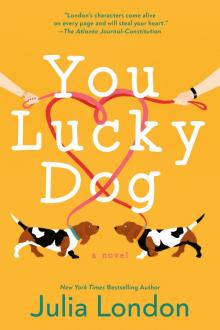 You Lucky Dog
You Lucky Dog The Devil in the Saddle
The Devil in the Saddle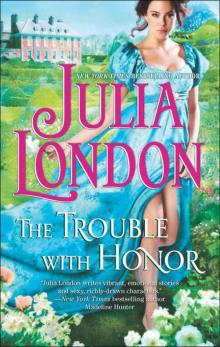 The Trouble with Honor
The Trouble with Honor Tempting the Laird
Tempting the Laird The Secret Lover
The Secret Lover A Light at Winter’s End
A Light at Winter’s End The Charmer in Chaps
The Charmer in Chaps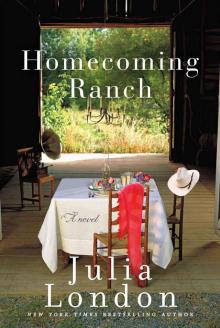 Homecoming Ranch
Homecoming Ranch Jack (7 Brides for 7 Soldiers Book 5)
Jack (7 Brides for 7 Soldiers Book 5)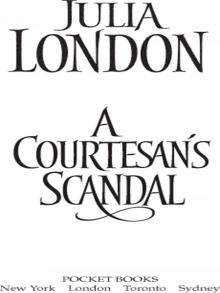 A Courtesan's Scandal
A Courtesan's Scandal Hard-Hearted Highlander--A Historical Romance Novel
Hard-Hearted Highlander--A Historical Romance Novel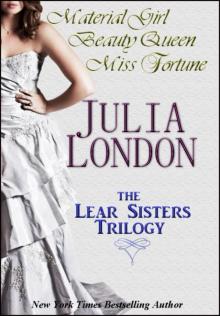 The Complete Novels of the Lear Sister Trilogy
The Complete Novels of the Lear Sister Trilogy The Last Debutante
The Last Debutante Suddenly Single (A Lake Haven Novel Book 4)
Suddenly Single (A Lake Haven Novel Book 4) Seduced by a Scot
Seduced by a Scot Highlander Unbound
Highlander Unbound Suddenly Dating (A Lake Haven Novel Book 2)
Suddenly Dating (A Lake Haven Novel Book 2)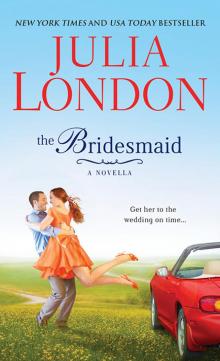 The Bridesmaid
The Bridesmaid The Seduction of Lady X
The Seduction of Lady X One Mad Night
One Mad Night Extreme Bachelor
Extreme Bachelor The Scoundrel and the Debutante
The Scoundrel and the Debutante The Revenge of Lord Eberlin
The Revenge of Lord Eberlin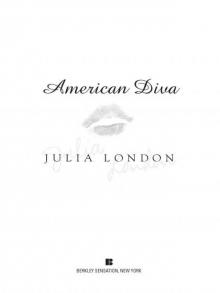 American Diva
American Diva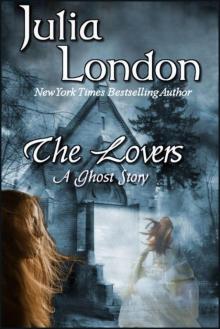 The Lovers: A Ghost Story
The Lovers: A Ghost Story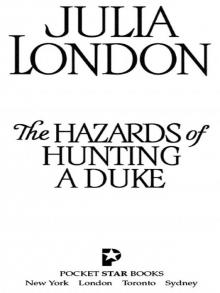 The Hazards of Hunting a Duke
The Hazards of Hunting a Duke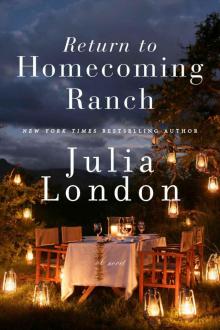 Return to Homecoming Ranch (Pine River)
Return to Homecoming Ranch (Pine River)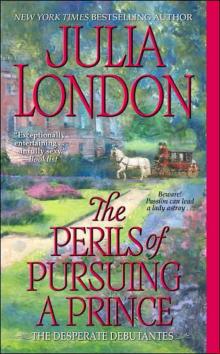 The Perils of Pursuing a Prince
The Perils of Pursuing a Prince Highlander in Love
Highlander in Love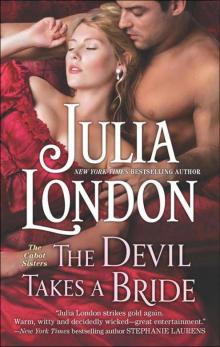 The Devil Takes a Bride
The Devil Takes a Bride Devil in Tartan
Devil in Tartan Wild Wicked Scot
Wild Wicked Scot Snowy Night with a Highlander
Snowy Night with a Highlander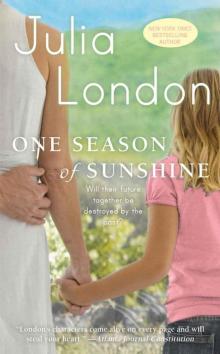 One Season of Sunshine
One Season of Sunshine Summer of Two Wishes
Summer of Two Wishes All I Need Is You aka Wedding Survivor
All I Need Is You aka Wedding Survivor Sinful Scottish Laird--A Historical Romance Novel
Sinful Scottish Laird--A Historical Romance Novel Suddenly Engaged (A Lake Haven Novel Book 3)
Suddenly Engaged (A Lake Haven Novel Book 3)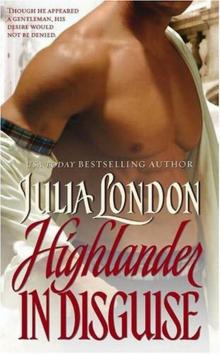 Highlander in Disguise
Highlander in Disguise Suddenly in Love (Lake Haven#1)
Suddenly in Love (Lake Haven#1)